EXCLUSIVE: Heavy The Boardwalk Crown: How Atlantic City’s Frank Gilliam Went From Elected To Imperiled
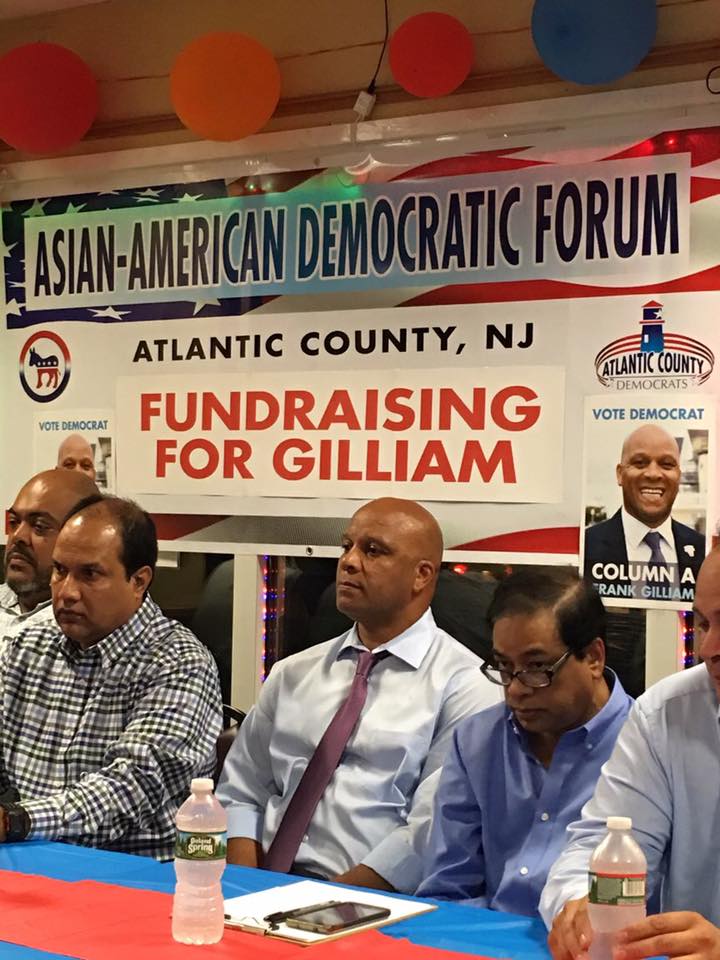
ATLANTIC CITY – The Bangladeshis were all in for Frank M. Gilliam.
Last September, a campaign fundraiser at a halal sandwich shop brought out about 70 members of Atlantic City’s thriving Bangladeshi community. A handful of Pakistanis and Gilliam’s campaign team rounded out the crowd at the event, billed as the Asian-American Democratic Forum.
With just a month and a half to go until the mayoral election Gilliam, the Democratic candidate, had a hefty campaign war chest, a well-funded super PAC, and momentum on his side.
Running on a ticket with Phil Murphy and an energized Democratic base in a wave gubernatorial election year was an asset. But the Republican incumbent mayor was tenacious and running a disciplined campaign.
At the end of that night inside Mr. Steak on Atlantic Avenue the more than $5,000 raised was arrayed on a front table. Checks for $200 were next to $50 cash contributions from hard-working cab drivers. The smells of beefsteak gyros and cheesesteaks soaked the air. A banner reading “Fundraising for Gilliam” hung across the front window, bracketed by posters of the smiling candidate.
Gilliam walked up to the front table. Next to him was Craig Callaway, a fellow Democrat, former councilman turned former inmate on bribery charges, now head of the campaign’s get out-the-vote effort. The two men were less than an arm’s length away from the table when, Callaway said, Gilliam’s hand went for the cash.
“He reached out to grab it,” Callaway said. “I’m like, ‘Frank, don’t touch that money.’”
Callaway said he brushed Gilliam’s arm away from the pile of cash, like a parent keeping a child’s hand away from a hot stovetop.
“Frank, don’t touch that, you don’t touch that money,” Callaway said he continued. He recommended Gilliam call his campaign manager Richard Winstead. “You call Rich and tell him to come get that money.”
Callaway was briefly distracted by another conversation and stepped away from Gilliam.
“I turn around – the money was gone,” Callaway said, then quickly pushed out his palm towards the listener to interject. “I’m not saying he took it, I’m just saying it was gone.”
Multiple people who were present that night confirmed the event, and that they donated to Gilliam, who won the election and is now the mayor of Atlantic City. More than five months later, none of their donations from that night are listed in campaign finance records Gilliam is required by law to file. All cash contributions of any amount must be reported under state campaign finance laws.
Azizul Islam Ferdous, a Bangladeshi community leader, said he donated cash to Gilliam that night. Councilman Chuen “Jimmy” Cheng said he donated $500 cash during that fundraiser. Sayed Kausar said he donated at least $100 cash during that same event. Gilliam didn’t report any of it.
Cheng remembers seeing Gilliam with cash and checks in his hand and says that “more likely than not,” it was during that fundraiser at Mr. Steak last September.
“If he took it, shame on him,” Cheng said.
Yesterday, Gilliam said his campaign never took cash, and that Cheng is “lying through his teeth.” Gilliam said Callaway is also lying and “crazy” to say he reached out for the cash, a ringleader of a “lynch mob” that has appeared since the inauguration, determined to take Gilliam down. Gilliam believes the FBI is already investigating his campaign, expects to be asked to sit down with agents for an interview soon, but says he has nothing to hide and is not worried.
“This is Atlantic City, my friend,” Gilliam said in a phone interview. “The seat of mayor of Atlantic City is, unbeknownst, one of the hottest seats in America, and I know that.”
“It’s unfortunate, again, wasting so much time with so much positivity going on in the city and me only being in office for much of three months,” he said.
“I know there are a few factions out to get me, I guess heavy is the head that wears the crown,” Gilliam said.
Questions about that table of money are sure to add to a controversy over a $10,000 check meant for the city Democratic committee that Gilliam instead deposited in his campaign account last October. Gilliam has said he swept up the check by accident with several other donations and deposited it in error. But the chairman of the county’s Democratic committee, which cut the check, says texts from Gilliam’s campaign manager Richard Winstead show Winstead and Gilliam anticipated the arrival of the money.
That $10,000 contribution was reported on Gilliam’s campaign finance disclosure form, and Gilliam repaid the money after the city Democrats raised a public stink.
“If I was trying to steal, why would I report it the money to ELEC?” Gilliam said during a city committee meeting last month.
Today, the Atlantic City Democratic committee will take the extraordinary move of voting to sign criminal complaints against the mayor for theft of the $10,000 donation. Some local Democrats are worried there are more shoes yet to drop, too many rumors that now have the ring of truth.
“Frank hasn’t done well for himself,” said Durwood Pinkett, an Atlantic City Democratic Committee member. “So that’s why, when this money came around, an instance of greed was born.”
Pinkett called Gilliam’s run for mayor “a political Ponzi scheme.”
How did Gilliam, a man who 15 years ago was running a mobile auto detailing business and reporting zero annual income, ascend to be the chief executive of New Jersey’s most troubled cash cow? How did a candidate publicly accused of domestic violence, who twice filed for bankruptcy, who once got in a fistfight with a pedestrian who walked too close to his car, a former Atlantic City councilman who stipulated in a state taxation document months after his election he actually lived 20 miles away, whose two terms on the council yielded few accomplishments save a helium balloon ban, become the Democrats’ standard bearer – and win?
—————-
It’s an unseasonably warm February day, and brothers Craig and Dave Callaway are cooling their heels in the parking lot of an Italian restaurant along Tilton Road in Northfield.
Wearing a fluorescent safety vest over a white t-shirt with dirty jeans, Craig sits on a decorative ledge, his feet dangling. Dave, in a roadway orange hoodie and red helmet identical to his brother, stands nearby, hands in his pockets.
Their crew works on repairing a gas line 50 yards away. No one bothers them as they speak to a reporter for 90 minutes. It would probably drive Frank Gilliam crazy, but most everyone in Atlantic City would say the Callaways are the reason Gilliam is mayor today. Their history with elections in Atlantic City goes way back.
Craig is the ninth child and Dave the tenth in a family of 13 children. They grew up in the Inlet, an uptown neighborhood where there were plenty of large families sporting a dozen children or more. Their childhood home was knocked down years ago for a basketball court.
From that rambunctious home, and through prowess on the basketball court, the Callways built a political power base. Not through conventional means. None of them became elected officials, save Craig, who lasted briefly as a city councilman and council president before being arrested in a bribery scheme. He resigned and pleaded guilty. While awaiting sentencing, he was charged with setting up a sitting councilman with a prostitute and videotaping the encounter to use as blackmail. The targeted councilman was a Baptist minister who said the oral sex from the topless woman was consensual, and the money he gave her afterward was to buy sodas.
Gilliam used that past to attack Craig Callaway – and Dave too, arguing “they’re one and the same.”
“It’s ironic that Mr. Callaway is in and around all of this,” Gilliam said. “I knew his history, that’s why I stayed away from him.”
Craig Callaway served his time on the bribery charges, was released after 42 months, and thereafter re-entered the wings of the city’s political theater.
The Callaways have perfected a method of delivering votes that have made the difference in virtually every election for the better part of two decades. Their critics call it voter fraud, and former Mayor Don Guardian’s campaign brought in two retired troopers to stage a sting the month before last year’s election. It showed Atlantic City residents being paid $30 to be “messengers” for absentee ballots.
A longtime Atlantic County standby, the messenger ballot is designed for the ill and indigent and allows their vote to be delivered to election authorities. According to state law, a messenger does not have to be family, can be paid, and is allowed to take in up to three ballots. In theory, it helps enfranchise the elderly and disabled. In practice, there are stretches of time where the ballot is in the hands of someone other than an election official or the voter.
The messenger and absentee ballots were the difference in Gilliam’s primary win over Marty Small. They came in big again on Election Day. When the city’s precincts reported in, Guardian trailed Gilliam by just 79 votes at the city’s voting machines. But the ballots from those who didn’t trudge to the polling place in that Tuesday’s wind and rain broke overwhelmingly for Gilliam. Guardian conceded that night.
Callaway’s assistance does not come cheap, and he says he will campaign for whoever he thinks is worthy, Republican or Democrat. He said he worked for the winning campaign of now-state Sen. Chris Brown, a Republican, last fall.
“I don’t have blind allegiance to any party,” Craig Callaway said, expanding his arms outward from their resting place on his ample gut. “If someone’s the better candidate, I’ll support you, no matter what party you are.”
Folks native to Atlantic City who have been taken to school by the Callaway operation respect them and say what the Callaways do is on the level. No one knows the town like they do – not the casinos and beach, but the real Atlantic City. The back bay neighborhoods, the senior citizen towers, the row homes and cottages on the side streets with delis on the corner and check cashing places in between.
Their operation simply takes advantage of this intimate knowledge of the community, their familiarity with who is undecided and how that person can be persuaded. It’s said they even know the postal routes well enough to trail mailmen to find voters who, ballot in hand, will be persuaded to vote for a certain slate by someone who appears at their doorway.
The Callaways get you another way: they are damn likable. Craig can look imposing, but all that is broken by a gleeful smile that makes his eyes twinkle. He said he was looking to stay out of the mayoral race last year, but was convinced to support Gilliam by a friend, Atlantic City lawyer Dan Gallagher. Craig now believes backing Gilliam was a mistake.
“Because people, when people want things, they become blinded by what they want,” Craig Callaway said. “Blinded by desire.”
The Callaways had issues getting their workers paid. By late October, they were told the super PAC did not have the money to pay them. At that point, they’d had enough.
“I told everybody, ‘Put all the tools down,’” Craig said. “We’re closing up shop.”
“We’re like, ‘we’ll deal with him in four years – we’ll see you in four years,’” he added.
They were convinced to return to the fold a week later, but believed the election was already in the bag.
“We knew Frank won because they knew there was no way Guardian could win with 1,300 (absentee) votes (already cast),” Callaway said.
On Election Night, Gilliam was at his victory party with his arms draped around the two Callaways, according to video of the event. But within days Craig Callaway said the payments to his workers stopped, leaving him with an $11,000 debt to pay his reliable get-out-the-vote employees. Eventually, Callaway and Pinkett said, the city Democrats had to hold a fundraiser at the Ducktown bar to make up the difference.
Gilliam raised more money just last week at his inaugural gala, held at Resorts Casino Friday night. Evander Holyfield showed up, and the mayor greeted guests and danced in a black double-breasted tux. The funds raised at the gala aren’t going to his election campaign, but to the not-for-profit Gilliam founded in 2006, called Connecting the Dots.
Checks for Friday’s gala were to be made payable to the non-profit. An invitation shows sponsorships of up to $35,000 were accepted. Full-page ads went for $1,000. Gilliam is proud of Connecting the Dots and says it does good work, and the day after the ball took prospective college students on a trip to Bowie State University in Bowie, Maryland. It offers scholarships, student sponsorships and tutoring. Donations to the non-profit are tax deductible and won’t have to be disclosed on campaign finance reports.
The organization last made a required filing with the IRS in 2016. According to the form, Gilliam worked 10 hours per week with Connecting the Dots and received no compensation. The group raised just under $10,000 in 2015, and spent just over $6,100 on the fundraising events, and wound up with $2,075 on the books at year’s end. Gilliam is listed as the vice-president.
————-

Historically, Atlantic City has more than earned its reputation for corruption. Mention names from the past to locals, and they’ll groan and defend their hometown luminaries in the same breath.
The name of Enoch “Nucky” Thompson, boss of Atlantic City during Prohibition and adapted into a character played by Steve Buscemi in the late HBO show “Boardwalk Empire” still earns an approving nod. Some older residents still take pride in their connections to Francis “Hap” Farley, the powerful state senator who took up Nucky’s mantle and ran the post-war Republican machine into the 1970s. Even James Usry, who served as the first black mayor but was arrested in 1989 in a State Police corruption sting, has a school named after him. Usry also owns a sympathetic place in the community as one who was “set up.” Given the fact he tried to give back marked bribe money, deposited in his hospital room while he was recovering from rotator cuff surgery, the feelings are understandable.
Since then, the FBI is always said to be checking something out in Atlantic City, but word rarely gets to the world “offshore” – how residents of the barrier island of Atlantic City refer to the mainland. Residents there could be forgiven for thinking widespread corruption was vanquished in the resort town.
The last 30 years have seen mayors come and go, but none under the cloud of political corruption. Downfall has come via the ballot box or personal foibles. Bob Levy was a household name for a minute, when he disappeared for two weeks as the feds investigated if he falsely claimed to be a member of the Army Green Berets in Vietnam to get enhanced veteran benefits. The day after his lawyers revealed Levy was in a Somerset County rehab clinic, he resigned.
That’s partially thanks to Jim Whelan, a legendary Democrat who died suddenly last year while serving in the state Senate. Whelan succeeded Usry as mayor in 1990 and finally ended the city Republican Party as the dominant political machine. Implacable, Irish, an upright turret of respectability, Whelan projected an image as one above reproach.
Born in Philadelphia, Whelan spent summers lifeguarding on Atlantic City’s beaches and eventually moved to the resort town for a job in the school system as a teacher and swim coach. During three terms as mayor he managed downtown development, renovated Boardwalk Hall, and championed business expansion and prosperity that never quite seemed to make its way to the neighborhoods further away from the Atlantic City Expressway. In 2001, he lost his bid for a fourth term to Lorenzo Langford.
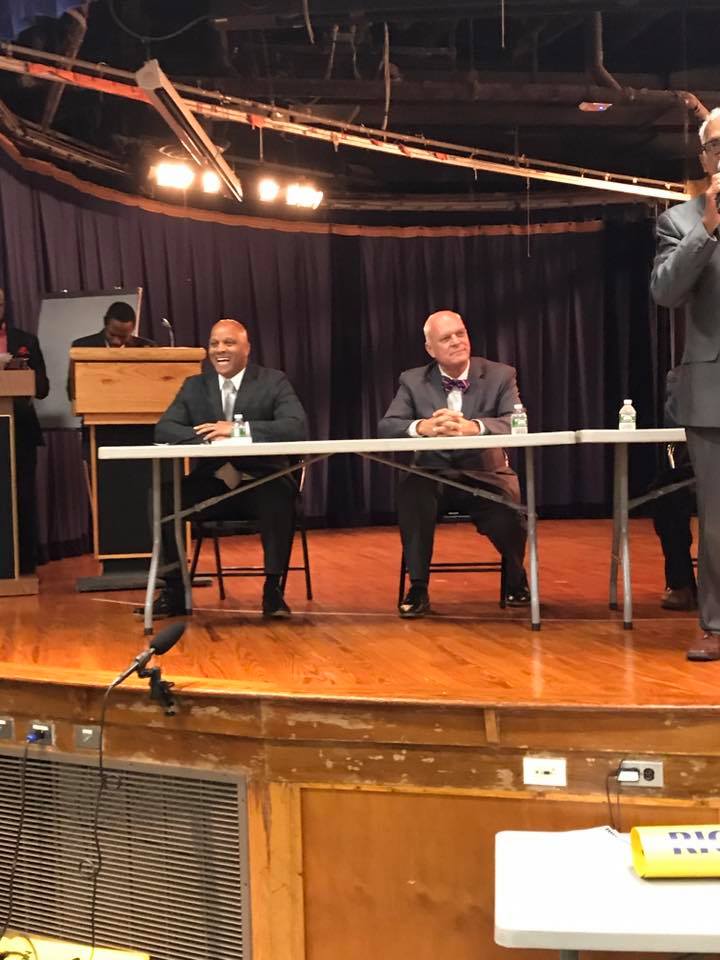
Twelve years later, voters put in office the most unlikely of Atlantic City champions: Don Guardian, a white, gay, bowtie-wearing Republican, and former head of the state’s Special Improvement District on the boardwalk. In an election held a year after Hurricane Sandy, which had flooded downtown and stranded people in shelters when Langford refused to make evacuation mandatory, Guardian squeaked by in a tight race.
Guardian’s single term was largely defined by a battle with Gov. Chris Christie, who was dead-set on a state takeover of the beleaguered but lucrative city’s finances. The two engaged in a war of brinksmanship and name-calling.
But the state takeover happened anyway, and voters soured on Guardian. Some believed the city needed more than a welcoming face to bring it back to glory. Gilliam was supposed to be that face.
————-
Frank Gilliam’s start in life was undeniably tragic. He was born in Atlantic City in 1970 to Frank M. Gilliam Sr. and Delores Gilliam, who became estranged shortly after Frank Jr.’s birth.
Delores was living at her mother’s house on Hummock Avenue with her three children when, late the morning of July 11, 1973, Frank Sr. arrived to take the kids for a car ride. When Delores refused to let her children go with him, a violent argument began. According to police, Frank Sr. chased Delores into the kitchen and used a three and-a-half inch long penknife to stab and slash her to death. She was 21 years old. Frank Jr. was barely three.
The case made page 36 of the next day’s local edition of the Press of Atlantic City. Running under the headline “Wife Slain; Police Hold Husband,” it’s all of 12 sentences, almost edged off the page by news of holdups and fights in Ventnor and a photo of a new educator starting work in a county Vo-Tech post.
Young as he was when she died, Gilliam said he has memories of his mother that he cherishes, and “they’ll be with me until the day I die.”
“What it did was allow me to understand life is precious,” he said of her death. “You can have something one day, and now it’s gone.”
Frank M. Gilliam Jr. somehow made it past his family tragedy. At school, he found an outlet in sports. He was dynamic on the basketball court, a star guard on the Atlantic City High basketball team. A local newspaper called his game “pivotal” to the team’s success.
The archives of South Jersey sports pages are full of mentions like a game on Jan. 11, 1988, where Gilliam carried his Vikings past Holy Spirit 68-66 by hitting the game-winning shot with two seconds left in overtime. After he graduated that June, the team suffered from his absence.
In a community where athletic excellence and notoriety can be a path to power, it would be natural for someone like Gilliam to move into elected office. But that path was in no way certain in the spring of 1988.
Following a principal’s advice, Gilliam decided to attend college. No one else in his family had before. With a lifelong affinity for artists, Gilliam said he thought about becoming an architect. Unfortunately, he said, his time at Delaware State ended freshman year due to bad grades, and he found himself back in Atlantic City, working jobs like security guard and bar back in a casino. By his own admission, Gilliam also found himself getting mixed up in bad situations on the streets.
“Part of my life was not always on the legal side, and part of my life has been a struggle,” Gilliam said.
Gilliam made it back to school and graduated from Stockton University in nearby Galloway in 1998. He was first elected to city council in 2009, though three months later he stipulated in a legal document he and his wife Shawna lived in Mays Landing. He bought his home in Atlantic City in 2011, and served two full terms on the council.
“I got eight years of trying to, in my opinion, doing the things that would bring Atlantic City back,” Gilliam said.
—————
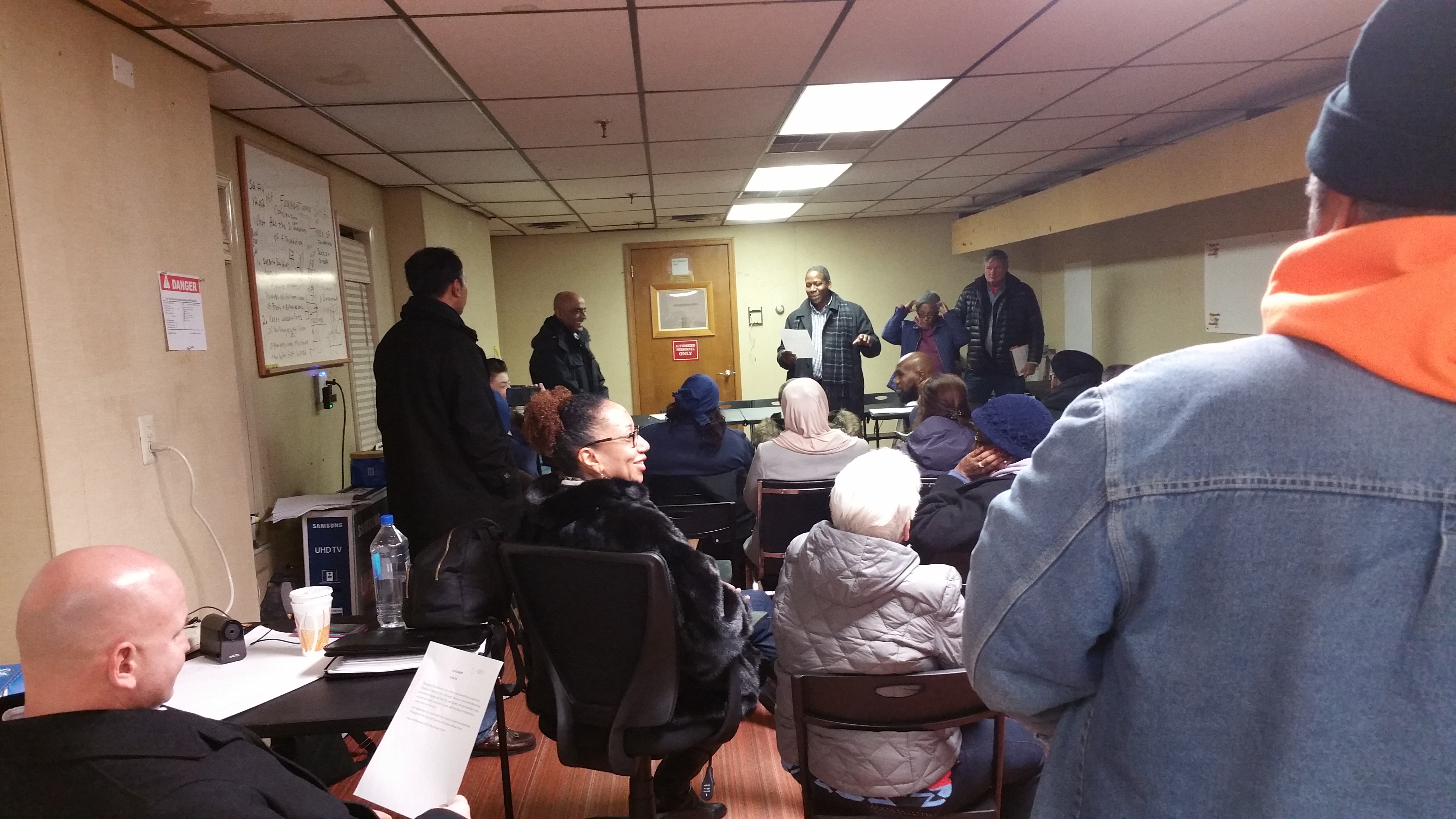
At the Back Bay Ale House, patrons can spend summer evenings in the open-air bar area, sipping drinks from mason jars as they watch the sun set in starburst colors over the inlet. On a gray and wet day in winter, the outdoor areas are closed, so Atlantic City Democratic Committee members Durwood Pinkett and Pam Fields sit at an upstairs table.
“I’m an implant,” Fields said. “I was born and raised in Newark, New Jersey.”
Fields’ aunt is Sheila Oliver, the longtime Essex County assemblywoman who was elected the state’s lieutenant governor on the ticket with Murphy last November. After the inauguration, Murphy designated Oliver to lead the state Department of Community Affairs (DCA). Among its large purview, the DCA supervises the Atlantic City takeover. The DCA declined comment for this article.
“I know parlor tricks, been around them all my life,” Fields said. “And when you see there’s a behavior of a person who now presents himself differently, where you, people around you have worked hard, dedicated, committed and said lost friendships. I lost friends. For a moment. But now we’re coming back around.”
Pinkett and Fields reached their breaking point with Gilliam in late January, when they found out Gilliam had signed and deposited the $10,000 meant for the city Democratic committee. That intensified suspicions they say they had during the campaign.
“When the money came on the scene, things changed for a fact,” Pinkett said. “Frank had this philosophy that he was the only one that mattered.”
According to Pinkett, when Langford chaired the city Democratic committee through 2016, the group rarely met, and fundraising ground to a halt. Langford did not respond to a request for comment. Two years ago, Pinkett and Fields took it upon themselves to rejuvenate the party. Getting the county Democrats to trust and fund them was key.
In the primary, Gilliam faced off against Small, the city council president who had run for mayor unsuccessfully twice before.
“Marty had tried two times and was unsuccessful, so I said, ‘Give somebody else a chance,’” Fields said.
The campaign between Gilliam and Small was bitter, ugly mudslinging. On Gilliam’s side was a city election’s first super PAC, Our Atlantic City, which made commercials about Small’s criminal arrest record. The super PAC targeted Small’s connection to a local video producer who had served time for heroin trafficking, despite the fact that both Gilliam and Guardian used the company to make videos for their campaigns.
“Clearly, ex-offenders are a big part of my platform,” Small – who was never convicted of a crime – told the website Breaking AC last March. “I grew up here in Atlantic City, in one of the worst neighborhoods. Do I just turn my back on them?”
On primary day, Small won at the ballot box by 100 votes. But then, 700 absentee, mail-in and messenger ballots went for Gilliam, giving him the victory by 500 votes.
Pinkett and Fields were on their way to a date night at the movies when they stopped at Back Bay Ale House. Over crab soup and buffalo wings, they remembered sitting at the same table with Gilliam during the campaign and trying to give him advice.
According to the couple, Gilliam’s behavior became increasingly erratic as the campaign wore on. At a campaign staff meeting the day after his primary victory, Gilliam lashed out at Councilman George Tibbitt, a member of the slate who had been Gilliam’s closest friend on the council.
“The man was almost in tears,” Fields said of Tibbitt.
And Fields began to hear dark rumors from the women of Atlantic City. While trying to bolster female support for the ticket, Fields said she ran into multiple people who repeated the same thing: “You know he beats women.”
The #MeToo era was just gathering steam, and those allegations weren’t the death blow to a public figure they might be now. And Fields thought they were just rumors, probably spread by political opponents. One woman came forward before the primary, saying she sought a restraining order against Gilliam when the two were dating in college.
Still, Fields realized Gilliam had a problem. She suggested a solution: a campaign event where Gilliam would honor women who had served on the city council. Oliver would be the keynote speaker, and agreed to clear her schedule to attend.
Gilliam would have none of it. He exploded, Fields said, demanding to know the benefit to him.
“F—k Sheila Oliver,” Gilliam said. The event never happened.
—————
Gilliam’s most immediate problems will likely be from within his own party. Michael Suleiman, the chairman of the Atlantic County Democrats, said in a phone interview that Winstead texted him looking for the $10,000 check before it was issued last October, showing that he and Gilliam knew the $10,000 was on its way. When asked, Suleiman declined to say whether he had confidence in Gilliam as the mayor of Atlantic City.
“It’s kind of irrelevant whether I have confidence in him or not,” Suleiman said.
Gilliam said Sunday Winstead was texting to ask about a different check, campaign funds that were on their way courtesy of Congresswoman Bonnie Watson Coleman (D – 12th District).
Members of the ad hoc committee are skeptical of Gilliam’s denials.
“We’re not talking about $5 here,” said John Devlin, a recently retired city cop who is on the ad hoc committee and is a member of the school board. “We’re talking about $10,000. $10,000, that’s a pretty big oversight.”
“You’re the mayor,” Devlin said in a phone interview. “One of your campaign promises was accountability. You’re not starting out too good, dude.”
On March 5, the city Democrats will vote to sign the criminal complaints against Gilliam for mishandling the check meant for their coffers. The measure is expected to pass. On the agenda is also the removal of committee chair Joyce Mollineaux, who discovered the check had been rerouted and was initially angry but, in a public reversal, has defended Gilliam since.
————
In his less than two months in office, Gilliam has managed to turn his supporters against him, intensified the hatred of his enemies, tangled with state monitors, get law enforcement on his tail, and cancel his honeymoon period. His power additionally limited by the state takeover, Gilliam politically is recognized as a dead man walking.
No one has turned on Gilliam more completely than the man who delivered him the mayor’s seat. Now, Craig Callaway laments galvanizing Atlantic City behind a man he has come to see as a dangerous charlatan.
“I have regrets,” Callaway said. “Mainly because we convinced a lot of people to support someone who’s not qualified.”
“I’ve studied psychology,” Craig Callaway said, “and I’m saying to look at Frank’s characteristics. Frank has all the characteristics of a sociopath.”
“He’s bad, he’s a bad person,” Craig Callaway said. “Evil resides in his eyes and in his heart. Something is wrong with that guy.”
Why such a harsh judgment?
“Because he stole money from people, and he used the cover of being a candidate for mayor, and at the time he was a sitting city councilman,” Craig Callaway responds.
“He needs help,” Craig continued, still speaking of the mayor. “He’s got evil in him. He does. I think he’ll hurt someone. Maybe himself. But he shouldn’t be in a position of power.”
No matter how long he lasts, Gilliam has managed one accomplishment during his time as mayor: uniting virtually everyone in a position of leadership in Atlantic City against him.
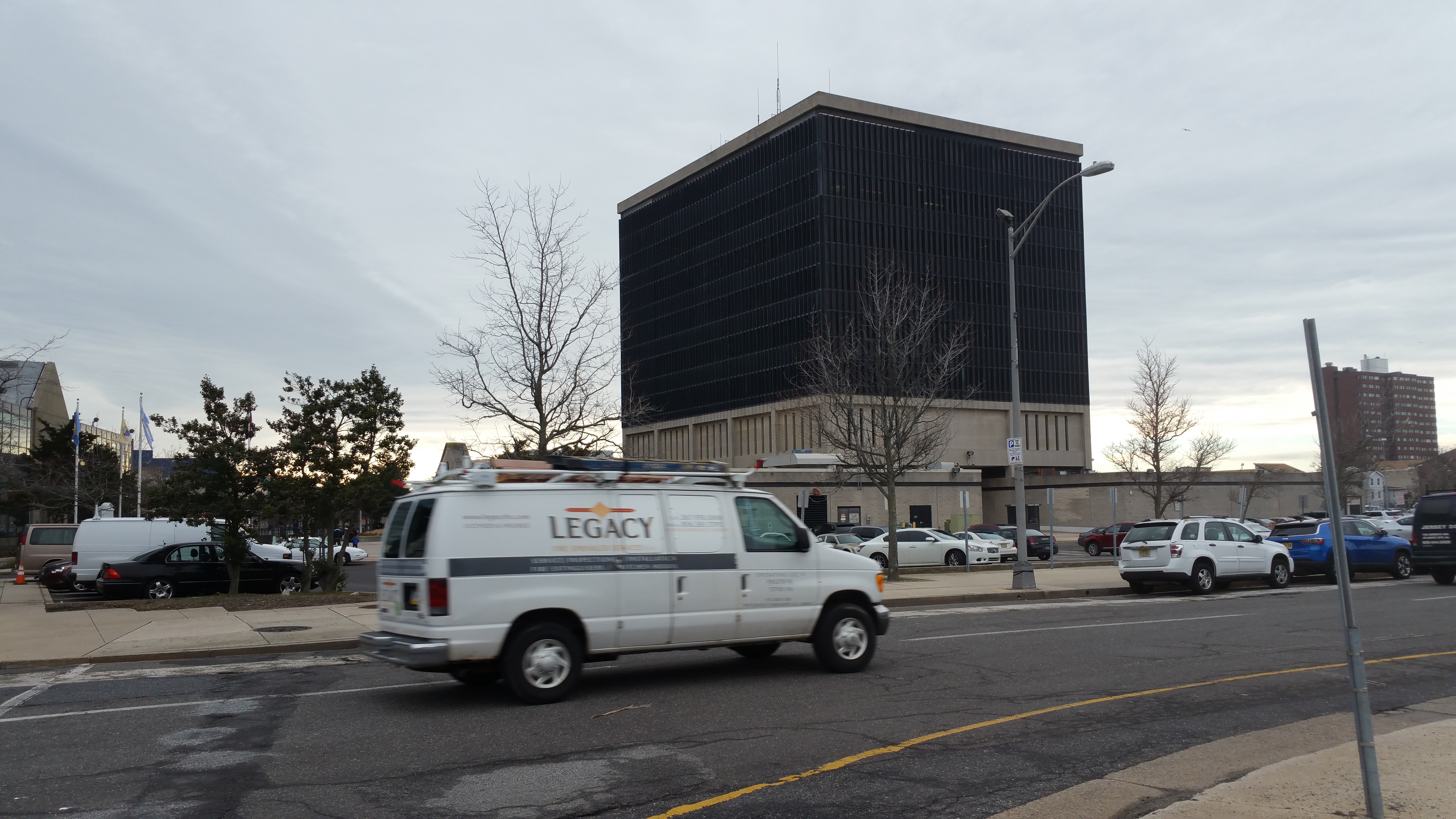
——–
Almost exactly one year ago, Gilliam announced his campaign for mayor. His slate of Tibbitt, Moisse Delgado and Jeffree Fauntleroy were by his side. Gilliam’s young son made an impressive debut as a public speaker showing ease in front of an audience.
The candidate vowed it was time for a change in Atlantic City.
“Prosperity is what we seek because we’ve been deferred too long,” Gilliam said.
“And this is my charge to you,” Gilliam said to the approving crowd. “Wake up. Today begins a new Atlantic City and tomorrow looks much brighter. I want to close with a quote I live by. James Allen:
Mind is the mastermind that molds and makes
And man is mind and evermore he takes
The tool of thought and we shape as we will
It brings forth a thousand joys, and a thousand ills
We think in secrecy and it comes to pass
Our environment is but our looking glass.”
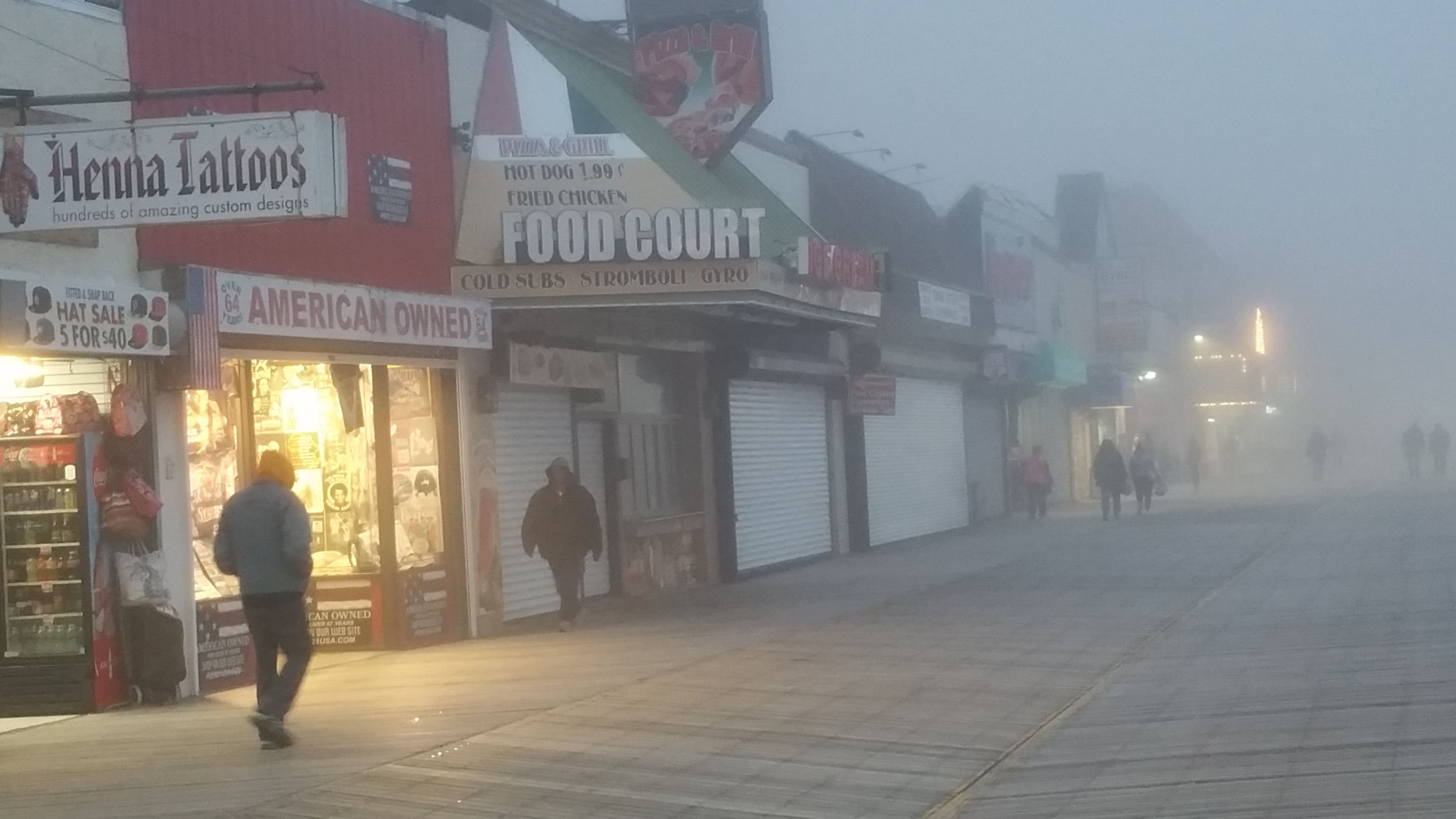









Noose tightens …
Probably the dumbest Mayor ever elected to the office of Mayor and that’s because he believes his own lies and that leads him to believe he’s above the law .
He got what he deserved
Atlantic City is a hopeless toilet politically speaking, most always has been. I loved growing up there as a kid and the town was run pretty well before the Casino era, but the problem is the same as it always was. The renter class represent to majority vote and their priorities are different from the those who own the brick & mortar. The result is people vote for the candidate who will deliver the most democrat controlled hand outs in exchange for votes instead of voting for candidates who will make it a better place to live. I’ll see your beaches in the Summertime AC, and cannot wait for another White House sub, other than that I will leave AC to the Callaways and their union thugs and the rest of the democrat hacks who make it a less attractive place to live.
Mayor Frank Gilliam and the Callaways are making Marty Small look like a choir boy — a helluva feat. Don Guardian was a reliable voice of protest regarding the corruption going on in AC. However, he clammed up immediately after the election, as the good ol’ boys network (e.g., Ocean Co. Republican George Gilmore, an ally to GENIII) lined up a sweet $175,000 administration job up in Toms River for Guardian.
Get norcross and his entire regime. Gilliam is an arrogant ass. He got what he deserved.